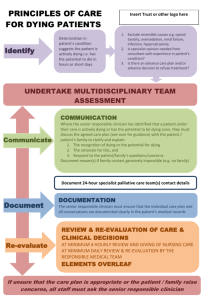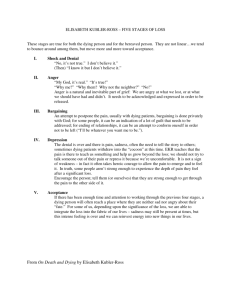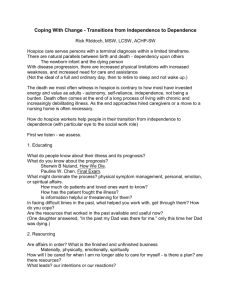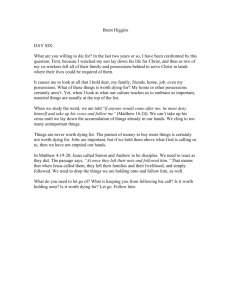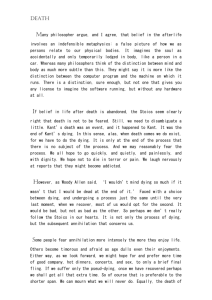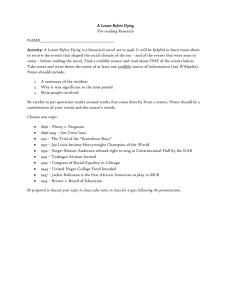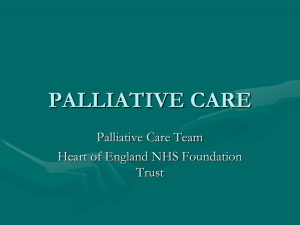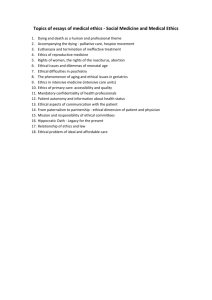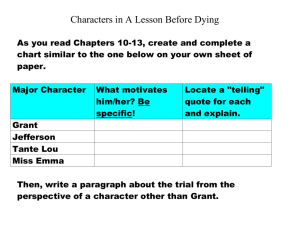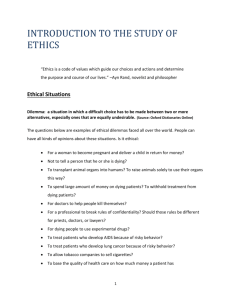BIOE 630
advertisement
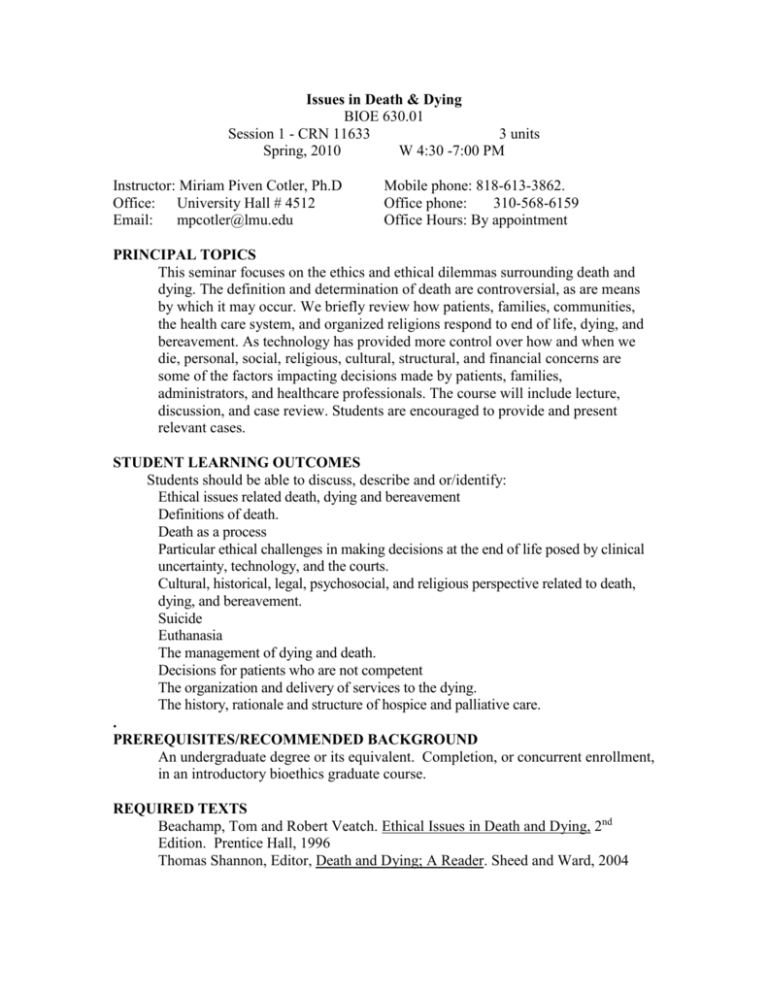
Issues in Death & Dying BIOE 630.01 Session 1 - CRN 11633 3 units Spring, 2010 W 4:30 -7:00 PM Instructor: Miriam Piven Cotler, Ph.D Office: University Hall # 4512 Email: mpcotler@lmu.edu Mobile phone: 818-613-3862. Office phone: 310-568-6159 Office Hours: By appointment PRINCIPAL TOPICS This seminar focuses on the ethics and ethical dilemmas surrounding death and dying. The definition and determination of death are controversial, as are means by which it may occur. We briefly review how patients, families, communities, the health care system, and organized religions respond to end of life, dying, and bereavement. As technology has provided more control over how and when we die, personal, social, religious, cultural, structural, and financial concerns are some of the factors impacting decisions made by patients, families, administrators, and healthcare professionals. The course will include lecture, discussion, and case review. Students are encouraged to provide and present relevant cases. STUDENT LEARNING OUTCOMES Students should be able to discuss, describe and or/identify: Ethical issues related death, dying and bereavement Definitions of death. Death as a process Particular ethical challenges in making decisions at the end of life posed by clinical uncertainty, technology, and the courts. Cultural, historical, legal, psychosocial, and religious perspective related to death, dying, and bereavement. Suicide Euthanasia The management of dying and death. Decisions for patients who are not competent The organization and delivery of services to the dying. The history, rationale and structure of hospice and palliative care. . PREREQUISITES/RECOMMENDED BACKGROUND An undergraduate degree or its equivalent. Completion, or concurrent enrollment, in an introductory bioethics graduate course. REQUIRED TEXTS Beachamp, Tom and Robert Veatch. Ethical Issues in Death and Dying, 2nd Edition. Prentice Hall, 1996 Thomas Shannon, Editor, Death and Dying; A Reader. Sheed and Ward, 2004 COURSE WORK/EXPECTATIONS1 Students are expected to read assignments prior to the date for which they have been assigned. Participation in class discussion is encouraged and is considered essential to the conduct of this course. The examination format is blue book, brief essay. It will assess identification and understanding of key concepts and relationships. A study guide will be provided. Assignments: Report on a work (preferably of fiction) dealing with death and dying. (due April 7). Students will provide a summary and lead a discussion of the work, with emphasis on ethical implications. Suggested readings: Fiction The Year of Magical Thinking, Joan Didion Paula-- Isabel Allende Refuge-- Terry Tempest Williams Grief, Andrew Holleran The Mercy Papers: A Memoir of Three Weeks—Robin Romm The Book Of Jesse Another novel Preapproved by the professor Non fiction Death’s Door, Sandra M. Gilbert Ending Life: Ethics and the Way We Die, Margaret Pabst Battin The Final Gifts, Callanan and Kelley Lizza, John P., Persons, Humanity, and the Definition of Death, Gilpin-Faust, Ruth The Republic of Suffering Pausch, Randy, The Last Lecture, New York: Hyperion Press, 2008 Other, pre-approved text Review and summarize one article on ethical issues in death, dying, afterlife, or bereavement. (due March 3) METHODS OF EVALUATION Due to grading deadlines, and in the interest of fairness, there will be no extension for assignments. Exam makeup will be granted only for verifiable 1 This syllabus and schedule are subject to change in the event of extenuating circumstances. If you are absent from class, it is your responsibility to check on announcements made while you were absent emergency or upon prearranged agreement with the instructor. Unannounced quizzes on the readings may be given. NOTE THE UNIVERSITY POLICY ON CHEATING AND PLAGUARISM. And THE BIOETHICS INSTITUTE POLICY ON CLASS ATTENDANCE STUDENTS ARE EXPECTED AND REQUIRED TO HONOR THE RULES. Grading Policy Class Participation Exam Article Critique Book Report and Presentation Total = 100 points = 100 points = 50 points = 150 points = 400 points averaged Semester grades will be determined on the total percentage of points earned. Grading will employ the +/- system: 97 + = A+ 89 - 87 = B+ 79 - 77 = C+ 69 - 67 = D+ 96 - 93 = A 86 - 83 = B 76 - 73 = C 66 - 63 = D 92 - 90 = A- 82 - 80 = B- 72 - 70 = C- 62 - 60 = D59 or below = F. Tentative Schedule Date Topic Jan 20 - 27 Feb 3 Feb 10 Feb 17 Feb 24 March 3 March 10 March 17 March 24 March 31 April 7 April 14 April 21 April 28 Readings (additional readings as appropriate) What Is Death? Dying today B&V I, pp1 – 64; S pp1- 9 Legal, historical, religious S 9 -31, handout Views of death and dying Truthtelling B&V II, pp64-98 Suicide B&V III, pp106-148 Euthanasia B&V 211- 248 Physician Assisted Suicide B&V IV, pp161 - 206 Article summary due S pp 63 - 131 Advance Directives and POLST Decisions by competent adults B&V 257- 283 Deciding for those who were competent; S 31 – 45 for children B&V 286- 325; 331 – 349 Deciding for those who were competent; adults (contin. Readings) no class; spring break The concept of futility B&V 349 – 385 Book report due; begin class discussions Healthcare Services for the terminally Ill; hospice, palliative care, home care S 45- 63 Book discussions continue Hospice and Palliative care continued Socio-economics and Limiting Care B&V 407 – 457 May 5 Exam Bibliography (partial) Lizza, John P., Persons, Humanity, and the Definition of Death, Baltimore, Johns Hopkins University Press, 2006. strongly recommended _________________Approaching Death; Improving Care at the End of Life, Washington, D.C., National Academy Press, 1997. _________Forgoing Life-Sustaining Treatment for Minor Patients, Los Angeles County Bar Association, 1996. AMA Council on Scientific Affairs, “Good Care of the Dying Patient”, Journal of The American Medical Association, Vol. 275, No. 6, February 14, 1996, pp. 474-478 Appleton, Michael, Good End; end of Life concerns and conversations about Hospice and Palliative Care, 2005. Battin, Margaret Pabst, Ending Life: Ethcs and the Way We Die,, Oxford, 2005 Becker, Ernest, The Denial of Death,, New York, Free Press, 1973. Brock, Dan, Life and Death: Philosophical Essays in Biomedical Ethics. Cambridge University Press, 1994. Brown, Norman O., Life Against Death: The Psychoanalytic Meaning of History.2nd Ed.. Hanover, Hew Hampshire: Wesley University Press, 1985. Byock, Ira, Dying Well; Peace and Possibilities at the End of Life, Riverhead Books, 1997. Callahan, D, Setting Limits: Medical Goals in an Aging Society. New York: Simon & Schuster, 1987. Callahan, Daniel, "Pursuing a Peaceful Death", Hastings Center Report (JulAug1993), pp33-38. Callanan, Maggie and Patricia Kelley, Final Gifts:Understanding the Special Awareness, Needs and Communications of the dying Bantam Books, 1997 Coberly, Margaret, Sacred Passage: How to Provide Fearless, compassionate Care for the Dying, Shambala, 2003 Cotler, Miriam Piven and Gregory, Dorothy Rasinski, "Futility: Is Definition the Problem? Parts I; II and III", Cambridge Quarterly of Healthcare Ethics (1993), Cotler, Miriam Piven, “’The Do Not resuscitate Order: Clinical and Ethical Rationale and Implications’”, Medicine and Law, 19:3, 2000. Curtis, J. Randall, Rubenfeld, Gordon, D. (2001). Managing Death in the Intensive Care Unit: A Transition from Cure to Comfort. Oxford University Press Inc. Dickinson, George, Death, Dying and Bereavement, 8th Ed. Conn.: McGraw Hill, 2006. Doka, Kenneth, Editor, Living with Grief; Loss in Later Life, Hospice Fdn of America, 2002 Durkheim, Emile, Suicide, New York: Free Press, 1951. Faust, Drew Gilpin (2008). The Republic Of Suffering: Death and the American Civil War. Random House, Inc, New York. Feifel, Herman. (1959). The Meaning of Death. The Blakiston Division, McGraw Hill Book Company, Inc. New York. Field, Marilyn J. & Cassel, Christine K (1997). Approaching Death: Improving Care At The End Of Life. Division of Health Care Services, Institute of Medicine. Fins, Joseph J., A Palliative Ethics of Care; Clinical Widsom at Life’s End. Boston: Jones and Bartlett, 2006 Gilbert, Sandra M., Death’s Door: Modern dying and the Way We Grieve, Norton, 2006 Groopman, Jerome, How Doctors Think. Boston: Houghton Mifflin, 2007, Himelstein, Bruce, Joanne Hilden, Ann Morstad Boldt and David Weissman, “Pediatric Palliative Care”, New England Journal of Medicine, m 350:17, April 22, 2004. Holleran, James, Grief, A Novel, Hyperion, 2006. James, John and Russell Friedman, The Grief Recovery Handbook, New York: Harper Perennial, 1998. James, John and Russell Friedman, When Children Grieve, New York: Quill, 2001 Jennings, Bruce, Editor with Gregory Kaebnick and Thomas Murray, Improving End of Life Care; Why Has It Been so difficult?. The Hastings Center, special report, 2004. Kane, Robert and Joan West, It shouldn’t Be This Way; The Failure of Long Term Care, Nashville: Vanderbuilt University Press, 2005. Kastenbaum, Robert J., Death, Society, and Human Experience, 7th Ed. Boston, Ally and Bacon, 2001. Kleespies, Phillip M., Life and Death Decisions; Psychological and Ethical considerations in End-of-Life Care”, Washington, D.C., American Psychological Association, 2004. Kubler-Ross, Elizabeth, Death: The Final Stage of Growth, Englewood Cliffs, New Jersey, Prentiss Heall, 1975. Lynn, Joanne, “Learning to Care for People with Chronic Illness Facing the End of Life”. JAMA, 284:19, November 15, 2000. Lynn, Joanne, Editor By No Extraordinary Means: The Choice to Forgo Life Sustaining Food and Water. Bloomington: Indian Press, 1989 McMahon, Jeff, The Ethics of Killing: Problems at the Margins of Life , New York: Oxford University Press, 2002. Meier, Diane E. and R. Sean Morrison, “Autonomy Reconsidered”, NEJM, 346:14, April 4, 2002. Morrison Diane and R. Sean Meier, “Palliative Care” NEJM, 350:2582-2590, #25, June 17, 2004 Nuland, Sherwin, How We Die: Reflections on Life’s Final Chapter, New York, Alfred Knopf, 1994. Pausch, Randy, The Last Lecture, New York: Hyperion Press, 2008 Quill, Timothy E., A Midwife Through the Dying Process: Stories of Health and Hard choices at the End of Life., Baltimore, Md, Johns Hopkins Press, 1996. Quill, Timothy, M.D., "Death and Dignity", NEJM, Mar 7, 1991, 324:10. Richardson, Ruth, Death, Dissection, and the Destitute, 2nd. Ed., Chicago: University of Chicago Press, 2000. Riley, G., Lubitz, J., Eggers, P., Gilden, D. M., Valentine, D. P., Lynn, J., Mendelson, M., Robinson, J. H., Teno, J. M., Lenert, L., Cher, D., Curtis, J. R., Rubenfeld, G. D. (1998). Potentially Ineffective Care in Intensive Care. JAMA 279: 651-654 [Full Text] Scitovsky, Anne and Alex Capron, "Medical Care At the End of Life: The Interaction of Economics and Ethics", Annual Review of Public Health, 1986. Spitz, Rabbi Elie Kaplan, Does the Soul Survive? A Jewish Journey to Belief in Afterlife, Past Lives, and Living with Purpose. Woodstock, Vermont, Jewish Lights Press, 2001 Sullivan, Amy, Mathew Lakoma and Susan Block, “The Status of Medical Education in End-of-Life Care; A National Report”, Journal of General Internal Medicine, 18, September, 2003. Wanzer, Sidney, H., M.D., et al. “The Physician Responsibility toward Hopelessly Ill Patients”, The New England Journal of Medicine, Vol. 310, No. 13, pp 955-959 Wanzer, Sydney H, MD, Glenmullen, Joseph, MD (2007). To Die Well: Your Right To Comfort, Calm, and Choice in the Last Days of Life. Da Capo Press. Wikler, Daniel, Guest Editor, "Medical Decision Making for the Demented and Dying", The Milbank Quarterly, 62:2, 1986.
